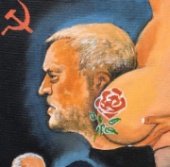|
WhiskeyWhiskers posted:There's apparently more energy wasted in their manufacture and transportation than plastic and pulping produces a lot of air pollution. It evens out a lot more with them being recyclable though. Bah. It depends on your methods. Paper bags can be a very nature-friendly choice. Compared to plastic bags anyway, can't beat a reusable fiber bag.
|
|
|
|

|
| # ? May 3, 2024 06:54 |
|
endlessmonotony posted:Bah. Yeah, this is definitely the best choice.
|
|
|
|
Namtab posted:Read as in past tense, not present You're cool namtab, why would you do a thing
|
|
|
|
baka kaba posted:You're cool namtab, why would you do a thing I only became left wing after I started working as a nurse and saw the effects of gov't policy on the people in work with. I provide good healthcare to the learning disabled, but they are let down by poor social care provision.
|
|
|
|
OwlFancier posted:Liberalism is here instead of totalitarianism largely because liberalism is more effective than totalitarianism at empowering the elite. Stringent press laws, a sane voting system, a decent education system, enforcing tax laws, and a ban on individual political donations of more than £50 per year are all entirely compatible with liberalism. Even quite strong stuff like requiring all press organisations above a certain size to be worker-run co-operatives wouldn't affect anyone's freedom of speech, despite effectively defanging Murdoch and co. So I don't think power begetting more power is intrinsic to liberalism, just broken forms of it. What we have now is pretty broken, granted, but not unfixably so. And if liberalism is more effective for capital than totalitarianism, why has the rise of liberalism coincided with a decline in the power of capitalism? Sure, things have been getting worse since Thatcher, but we're still an order of magnitude better off than we were in Victorian times. And Brexit was massively against the interests of capital, but wouldn't have happened under a totalitarian system. (Bonus question: if liberalism is more effective than totalitarianism, why do so many people itt favour totalitarian policies in their perfect leftist government?) Spangly A posted:Liberalism isn't "don't shoot people" and that's as far as I got with that nonsense Yes, please wank some more about terminology. Surely it matters deeply whether we call the thing you're opposed to "liberalism" or "the general agreement that political violence is bad". pumpinglemma fucked around with this message at 17:21 on Jul 31, 2016 |
|
|
|
A government that maintains a military and a society that supports that military's existence doesn't believe political violence is unacceptable.
|
|
|
|
endlessmonotony posted:Bah. https://www.youtube.com/watch?v=hFgtIziShmc
|
|
|
|
Namtab posted:I only became left wing after I started working as a nurse and saw the effects of gov't policy on the people in work with. Yeah but still, the Mail I'm just kidding, you're good people. What's May's government looking like on that front anyway? I'm not exactly expecting a turnaround but are they at least looking like they might start funding social care and mental health better? As far as anime and plastic bags goes, this is all I know but I'm on board 
|
|
|
|
pumpinglemma posted:And if liberalism is more effective for capital than totalitarianism, why has the rise of liberalism coincided with a decline in the power of capitalism? Definitely had nothing to do with the organised resistance to capital by the workers!
|
|
|
|
What disturbs me about an awful lot of the rants about killing your opponents is that they are fantasies of what you would do when you are in power or have power.Guavanaut posted:That's not what I said, but let's pretend that it is: I do not believe that the current treatment of the poor or disabled constitutes violence. Things are very carefully framed to ensure that actual violence is not required for the current deprivation to occur. It's what makes it all the more insidious. And yeah, in general I hold that all violence is bad. No violence is better than even some violence. Even given that though some violence is more justifiable than other. Shooting at unarmed protesters, not justifiable. Killing someone in self defense, usually pretty justifiable. That someone defending themselves is driven to violence doesn't make the violence they deal in that case "good". So I hold that violence should be minimised in general. The next question for me then is, do I think that a violent campaign is the best response to the plight of the poor and disabled? To me the answer to that is no. Currently the left can't mobilise the threat of a mass movement against the status quo. That is a threat of potential violence which has proved effective in the past. So what we would be left with would be isolated violent attacks against political opponents. If you don't think that all that will lead to is demonisation of your movement and more nodding along by the conservative minded slice of the population then I don't know what to say. So yeah, in general whilst I think that the deck is stacked firmly against reformers, as it has always been. I do not think that a violent campaign is the answer. Dramatic acts to highlight the plight of the poor? Yes. Trying to get people you know to become aware of the issue? Definitely. Challenging the conservative narrative wherever it is being pushed? Of course. Giving up the struggle? Never. Generally the only way actually violent campaigns (as opposed to the ones backed by the Spangly A posted:This is a factual statement, the world would be better if everyone caught thinking like a neocon was shot on sight and I can't see the liberal handwaving because there's a lot of disabled corpses in the way You'd end up with probably as many corpses as there are disabled people and many of those corpses would be of more conservative disabled pensioners. Spangly A posted:Nobody is calling for glorious revolution or trading arms dealers because "thousands" is probably less deaths than a left wing milita would need to change the political landscape enough to save said thousands. And so for now, we watch Jeremy Corbyn attempt to play nice with a pack of wolves in damaged clothing. That's where I disagree. A left wing militia killing a few thousand people will not do it. It will just entrench the battle lines. Colombia has been in a de facto civil war for decades without a resolution because both sides have been more than happy to kill each other. The basic problem is that there are too many people who disagree with us. Shooting at them won't make them change their mind and they will have just as many guns if not more..
|
|
|
|
pumpinglemma posted:Stringent press laws, a sane voting system, a decent education system, enforcing tax laws, and a ban on individual political donations of more than £50 per year are all entirely compatible with liberalism. Even quite strong stuff like requiring all press organisations above a certain size to be worker-run co-operatives wouldn't affect anyone's freedom of speech, despite effectively defanging Murdoch and co. So I don't think power begetting more power is intrinsic to liberalism, just broken forms of it. What we have now is pretty broken, granted, but not unfixably so. Liberalism is not a new idea, for all that it's branded neoliberalism the idea itself is far older, and was very prevalent in victorian times. The things that make our lives better nowadays are socialist ideas like the welfare state combined with a general increase in productivity and globalization lifting the poverty floor a bit and dumping most of the poverty into other nations so we can ignore it better. I would entirely dispute that Capital has declined in power significantly, it's just gone from controlling countries very literally to operating almost entirely outside the structure of countries Where once you had the East India Company you now have the multinational corporation, which doesn't need to bother with the actual administration of a nation-state because it can exist entirely outside of them while still raking in money from them. Certainly you can blend socialism and liberalism as that was done quite a lot during the past century, the reason it was done however was primarily because Capital was afraid of revolution such as happened in the USSR, and so felt it necessary to accede some power to the masses in the form of social democracy to stave off that revolution. The issue is that the liberalism part of that ideology doesn't really serve much purpose. The good bits are all the social parts, the liberal parts are there because that's the point from the perspective of the powerful, to preserve the hierarchical structure of society using wealth as a basis. As to why people favor totalitarianism it's because totalitarianism is what you get when you lack the ability to build as successful a propaganda machine as liberalism has managed. It's the resort of those who feel that a worse form of government attempting to help the majority is better than a superior form of government committed to harming them. Communism would be the liberalism-equivalent form of (non) government, where the idea is self perpetuating rather than enforced crudely by a powerful state. Also some people just like hurting the people they feel deserve it because that's cathartic. OwlFancier fucked around with this message at 17:37 on Jul 31, 2016 |
|
|
|
pointsofdata posted:Fortunately most countries (including ours!) managed to end their own apartheid far more peacefully than was required in south Africa. Perhaps if we had a functional opposition to the government we'd be able end starvation in Britain. Tory Government starving populace, Labour Party refusing to back leader who wants to stop it? BLAME CORBYN
|
|
|
|
pumpinglemma posted:why has the rise of liberalism coincided with a decline in the power of capitalism?
|
|
|
|
Munin posted:I still find the hatred and rivalry between the MoS and the Mail to be one the funniest thing in British media. I'm sure I'm being dense but what is the MoS
|
|
|
|
The Saurus posted:I'm sure I'm being dense but what is the MoS Mail on Sunday.
|
|
|
|
pumpinglemma posted:And if liberalism is more effective for capital than totalitarianism, why has the rise of liberalism coincided with a decline in the power of capitalism? I don't think you know what liberalism is.
|
|
|
|
Munin posted:Generally the only way actually violent campaigns (as opposed to the ones backed by the This isn't true at all, unless you're being incredibly squirrely about your definition of 'mass unrest'. It's an uncomfortable fact that a lot of what we take for granted in society had to be literally fought for, often by not very nice people
|
|
|
|
I am guessing there is a confusion between social liberties and capital L Liberalism? I mean, you can't entirely blame people for that because that's an intentional conflation.
|
|
|
|
OwlFancier posted:I appreciate that it isn't obvious if you aren't looking for it, and that's part of its strength, but liberalism is always couched in the idea that the wealthy and powerful have a right to be so (and unspokenly, though sometimes not so, that the poor and powerless are rightly poor and powerless) and that challenging that order, that deeply illiberal state is an attack on the concept of Freedom itself. Er? Sorry? OwlFancier posted:Liberalism as it stands is the enshrinement so completely in a culture, of the idea that power should beget more power and weakness is a moral failing and should be punished, that these are regarded as virtues rather than injustices. In such a culture, what is the need for armed repression? People will repress themselves and each other for questioning the order that keeps them down. The attitude far predates the rise of liberalism. It is in fact the attitude liberalism was initially fighting. You know, the twin pillars of liberty and equality. Liberalism was an attempt to move away from the old moralistic framework of the world where people were poor becuse they were bad people who displeased god and the rich were merely blessed due to their moral and godly virtue. The fact that that idea is so loving difficult to kill says more about people than about liberalism. OwlFancier posted:The government doesn't oppose an active police state because they believe it's wrong, they simply don't see a point in having an overt one because what's the need? If you give people a visible force of oppression to fight against they'll fight it, when you instead convince them from birth that they should oppress themselves and their neighbors, you don't need any armed gunmen to tell them what to do. The government opposes an active police state? OwlFancier posted:They have absolutely no respect for the important freedoms of the people they rule, that's why every communication you send is monitored OwlFancier posted:and every penny you earn is fed back into the pockets of the wealthy, every public service is reorganized to profit the powerful at the expense of the public who built it, and every freedom you can point to as a triumph of liberalism is invariably corollaried by (as long as you have the money). And this is a problem we have had with basically every polity ever from the old catholic church to communist Russia to the UK today. People will do their level best to accumulate power and then use that power to give themselves privileges whilst trampling on those below them. The only question is how well and for how long we can prevent them from doing so before some sort of reset is needed.
|
|
|
|
Can someone dig out those 19th century loads of bollocks declaiming the glories of wondrous Liberty while saying we should totally enslave the blacks because we can't have liberty and equality without someone to do all the work? Liberalism has always been an ideology which says freedom and equality for everyone (and by everyone I mean me and my fellow rich guys hahaha loving none for you proles)
|
|
|
|
Tell me more about human nature, Munin.
|
|
|
|
R. Mute posted:Tell me more about human nature, Munin. Sorry, did you want a positive little homily about how people are universally good despite all the poo poo people rail against in this thread? There is a constant struggle and one side makes a few gains and then the other claws some back. So far I think think we're in a better spot today than we but not because various people who manage to claw out some privileges for themselves were universally humane and magnanimous. Tell me more about human nature yourself R. Mute.
|
|
|
|
Namtab posted:I read the mail and they hated bags. You sure it wasn't a typo?
|
|
|
|
Munin posted:The attitude far predates the rise of liberalism. It is in fact the attitude liberalism was initially fighting. You know, the twin pillars of liberty and equality. Liberalism was an attempt to move away from the old moralistic framework of the world where people were poor becuse they were bad people who displeased god and the rich were merely blessed due to their moral and godly virtue. Might want to look up the Protestant Ethic.
|
|
|
|
Owen Jones posted:Labourís current polling is calamitous. No party has ever won an election with such disastrous polling, or even come close. Historically any party with such terrible polling goes on to suffer a bad defeat. Owen Jones posted:The Labour leadership effectively has the same fiscal rule as Ed Balls in the last election: balance the nationís books, not to borrow for day-to-day spending, but do borrow in order to invest. The leadership proposes a British investment bank: again, in the last manifesto. The key policy at the launch of Corbynís leadership campaign were equal pay audits. That was also in the last manifesto. Owen Jones posted:Yes, the media are always going to demonise a left-wing leader. But, again, if we just believe the public are robots who can be programmed what to think, then we might as well all give up. Sadiq Khan was not standing on a radical left programme in his London Mayoral bid. Nonetheless he was remorselessly portrayed as the puppet of extremists by his opponent and his ally ó the capitalís only mass newspaper, as well as several national newspapers. He managed to counteract it, and won. His ratings are extremely favourable. The press lost. https://medium.com/@OwenJones84/questions-all-jeremy-corbyn-supporters-need-to-answer-b3e82ace7ed3#.durajocc1
|
|
|
|
Munin posted:I do not believe that the current treatment of the poor or disabled constitutes violence. Things are very carefully framed to ensure that actual violence is not required for the current deprivation to occur. It's what makes it all the more insidious. You don't believe that the current treatment of the poor or disabled constitutes violence because in your mind you've defined violence in an rear end-backwards way which means that you apparently miss the massive apparatus of violence wielded by the state to protect the interests of the capitalist class. Munin posted:The attitude far predates the rise of liberalism. It is in fact the attitude liberalism was initially fighting. You know, the twin pillars of liberty and equality. Liberalism was an attempt to move away from the old moralistic framework of the world where people were poor becuse they were bad people who displeased god and the rich were merely blessed due to their moral and godly virtue. You clearly have no goddamn idea about the history of liberalism or what it initially stood for, so maybe you should read up on the subject before you embarass yourself any further?
|
|
|
|
Liberalism is not in opposition to the idea that the powerful are powerful because they are virtuous, it's the latest defence of that idea. It at best can be said to have moved us away from the idea that power comes from God and the king rules because God wills it, to the idea that power comes from some virtue inherent in potentially anyone and if you just work hard enough, you too can have power, while ignoring completely the idea that people are products of their environment.
|
|
|
|
Munin posted:Sorry, did you want a positive little homily about how people are universally good despite all the poo poo people rail against in this thread?
|
|
|
|
pumpinglemma posted:

|
|
|
Munin posted:Generally the only way actually violent campaigns (as opposed to the ones backed by the Violent campaigns also are effective at changing society when there is a non-violent pressure group the establishment can concede to to avoid the threat of further unrest (See: indian independence, american civil rights). There, you use the fear of the establishment that violence will escalate to pressure them into accepting reforms that they would otherwise not agree to via wholey peaceful means. I don't think we are at a stage where that could be the case, but revolution is not the only way to success for violent political groups. Nothingtoseehere fucked around with this message at 18:47 on Jul 31, 2016 |
|
|
|
|
Munin posted:The next question for me then is, do I think that a violent campaign is the best response to the plight of the poor and disabled? To me the answer to that is no. Currently the left can't mobilise the threat of a mass movement against the status quo. That is a threat of potential violence which has proved effective in the past. So what we would be left with would be isolated violent attacks against political opponents. I agree that this is the key stumbling block. Currently the left is unable to mobilise people to do something earth-shattering like going to a polling station and making a mark in the right box with a pencil. Convincing the public at large to go out and commit political violence is pretty far fetched, doubly so as the risks are astronomical for anyone with something to lose under the present system (job, mortgage, family to support etc). Maybe it's a failure of imagination, but I don't think isolated acts of political violence can achieve the lasting change people in this thread want. Step 1 has to be a mass education campaign so people understand why there needs to be change and what's wrong with the status quo. Having seen just some Corbyn fans effectively 'raise' £4m, it does make me think that some sort of mass kickstarter to create a left wing voice in the traditional media would not be a bad place to start.
|
|
|
|
Corbyn laid down some policy in the Observer... and got a couple of little digs in at Smith along the way.quote:Unite has called on the government to stamp out zero-hours contracts, as has been done in other countries, a call backed by Labour under my leadership.
|
|
|
|
I think the reason why people don't think of the cuts to welfare as violence is because of differing definitions of the word violence. It's more state sponsored abuse
|
|
|
|
Darth Walrus posted:Corbyn laid down some policy in the Observer... and got a couple of little digs in at Smith along the way. Told you all I was waiting for Corbyn to one up Smith. Not that he really needed it given my opinion on Smith but that right there would get my vote, why vote for one hour contracts when we can have something better?
|
|
|
|
Two-hour contracts?
|
|
|
|
Angepain posted:Two-hour contracts? Marxist madness.
|
|
|
|
As a good rule of thumb, folks, if you want to see Corbyn setting out a platform and doing policy, his Twitter account is where to look. Contains a bunch of links to statements and articles on him and his team's stance and ideas, and has for quite a long time now.
|
|
|
|
More about that Michaela school: https://twitter.com/AnthonyAdler/status/759015010462945280
|
|
|
|
Well, just having a "lively" discussion with my ex-wifes' current husband, in which he's advocating forced sterilization for women on benefits with 3 or more kids, based on this meme: The fact that there is a benefits cap, and it's a lie doesn't matter. Post-Facts politics is real.
|
|
|
|

|
| # ? May 3, 2024 06:54 |
|
Prince John posted:I agree that this is the key stumbling block. Currently the left is unable to mobilise people to do something earth-shattering like going to a polling station and making a mark in the right box with a pencil. Convincing the public at large to go out and commit political violence is pretty far fetched, doubly so as the risks are astronomical for anyone with something to lose under the present system (job, mortgage, family to support etc). I want to put it to you that 'mass education campaign' is the left wing version of 'it's just human nature'. It always gets trotted out as the solution to the left's woes as if someone just went to the masses and explained to them The Way Things Are then the veil would lift from their collective eyes and they'd rush to vote for the maximum communism candidate at the polls. It's comfort thinking that's self-defeating because it offers a deceptively simple solution to the left's woes that sidesteps having to tackle the genuinely difficult problem, which is that there are a great many people who are well informed and have honestly not come to the same conclusions, and it is on persuading those people that the road to power lies.
|
|
|
































